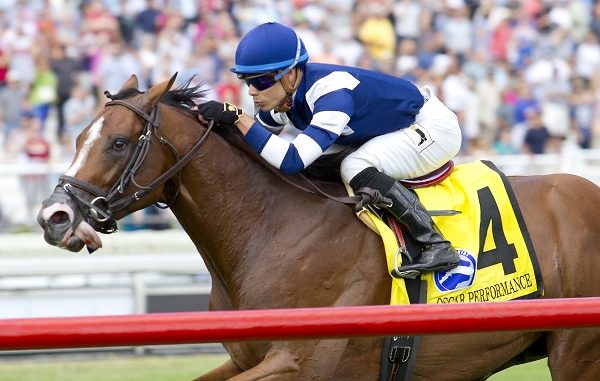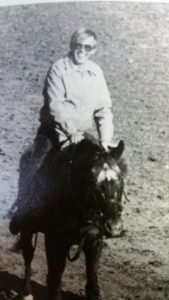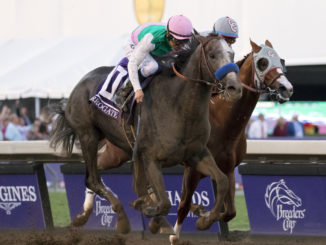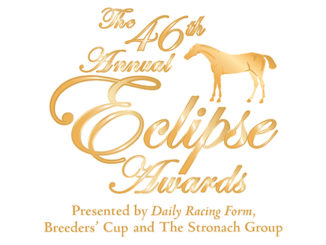
The last two decades has seen the Eclipse Award electorate get creative with its some of its year-end selections, asserting its independence from precedents set by voters of yesteryear and at times downplaying or ignoring important criteria such as the results of head-to-head match-ups. Could 2017 see another historic bombshell?
It could if the August 26 Travers (G1) fails to produce a clear cut leader among dirt-based three-year-old males. That is, if someone other than Always Dreaming, Cloud Computing, Tapwrit, Good Samaritan, West Coast, Irap, or Girvin reaches the winner’s circle.
There would still be the Pennsylvania Derby (G1) and the usual assortment of races open to three-year-olds and up to help make sense of it all, but in the absence of that Eclipse voters could be inspired to go where no group of them has gone before.
After two early-season setbacks in Kentucky, Oscar Performance has rattled off three consecutive wins in the Pennine Ridge (G3), Belmont Derby (G1), and Secretariat (G1), the latter achieved (for what it’s worth) in a final time faster than the Arlington Million (G1) on the same card. He is presently a clear standout among three-year-old males on the turf.
Is he the best three-year-old male, period? While it’s impossible to say, some would use his two-for-three season record against Good Samaritan, who romped versus 2017’s first two classic winners in the Jim Dandy (G2), as a sort of measuring stick. Ultimately, it’s unknowable unless he tries dirt himself.
Oscar Performance is now possible for the Joe Hirsch Turf Classic (G1) on September 30 at Belmont Park. A victory there against older rivals would enhance his credentials and put vast pressure on his dirt counterparts to do the same, a tough ask with horses like Arrogate and Gun Runner (and to a lesser extent Mor Spirit, Cupid, Shaman Ghost, and Keen Ice) around.
With dirt the surface on which the Triple Crown is contested, the three-year-old male division has been virtually immune from being a target of the Eclipse electorate’s whimsical deviations. The last two U.S.-based three-year-olds to win the turf male championship, Kitten’s Joy (2004) and Sunshine Forever (1988), obviously couldn’t depose dual classic winners Smarty Jones and Risen Star. Even as good a horse as Manila (1986) couldn’t do it against Snow Chief, who won just one classic and not at all past Memorial Day. But that was a generation ago, and the electorate is far more malleable and open to doing the unconventional in this era.
As one of those rigid and inflexible ballot holders handcuffed by tradition and precedent, I couldn’t vote for a specialist like Oscar Performance as champion three-year-old male. That doesn’t mean, however, that I couldn’t see him winning it anyway.
David Whiteley RIP
 Daily Racing Form‘s Marty McGee broke the news of the death of former trainer and multiple Hall of Fame nominee David Whiteley at his home in South Carolina on Saturday at the age of 73.
Daily Racing Form‘s Marty McGee broke the news of the death of former trainer and multiple Hall of Fame nominee David Whiteley at his home in South Carolina on Saturday at the age of 73.
It goes without saying that the son of Hall of Fame trainer Frank Whiteley was a distinguished horseman in his own right. Career highlights include training Coastal to an upset win over the Triple Crown-seeking Spectacular Bid in the 1979 Belmont S. (G1), and Eclipse Award championships for the fillies Revidere (1976), Waya (1979), and Just a Game (1980). The latter two are honored annually in New York with graded stakes run in their name.
Like contemporaries such as John Veitch and the late John Gaver Jr., Whiteley followed in the footsteps of his father by training for the prominent owner-breeders that dominated the sport for much of the 20th century. As those families died off or left the business, Whiteley’s business tapered off.
According to Equibase, Whiteley-trained horses won 436 times from 1970 through 1995 at a 21% clip. This writer (and Hall of Fame supporter) was still in high school when Whiteley trained his last winner, on November 10, 1994, which in part explains the paucity of support Whiteley has received in recent years on the Hall of Fame ballot despite his sterling qualifications.
In a 1997 The Backstretch magazine profile of he and Veitch, Whiteley noted that his decision in the early 1980s to work privately for Calumet Farm, a job that lasted less than two years and that required him to give up all his previous owners, cost him dearly when it came time to re-open a public stable.
“I cut my own throat in this business when I went to Calumet. I gave up some good owners,” he said.
Racing changed, too, and to a style Whiteley was unaccustomed to.
“It is different. The whole thing’s changed,” Whiteley said. “It would be awfully hard to explain without knocking people. I haven’t had much stock. If you don’t have the right stock, it takes a lot of the fun out of it. All these drugs and Lasix. It just seems that you have be a pharmacologist to compete.”
“David’s a brilliant horse trainer,” said Veitch, “but he threw up his arms and walked away because he wasn’t a promoter.”
A former Whiteley assistant, Shug McGaughey, has enjoyed an illustrious career and was inducted into the Hall of Fame in 2004. Here’s hoping his old boss will join him and his father, if only posthumously, as soon as possible.



